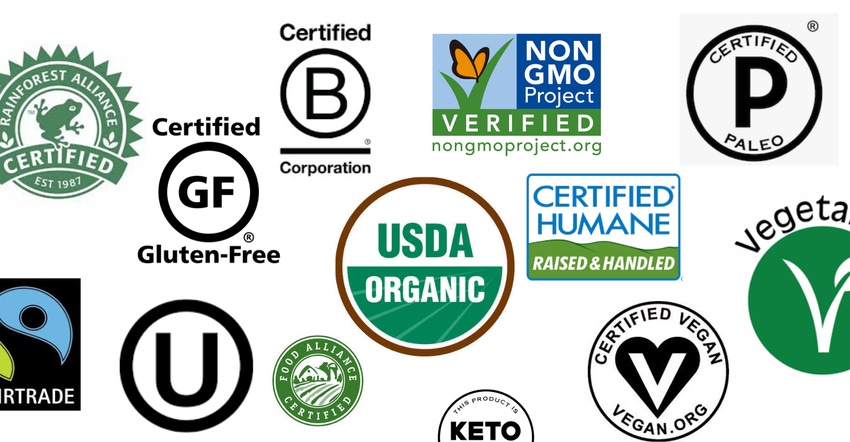Do consumers have certification fatigue?
A recent study suggests that certifications help natural products brands build consumer trust in an increasingly "clean-minded" society.

Keto, paleo, vegan, gluten free, fair trade, non-GMO, organic, clean label, B Corp, kosher, halal … the list of available certifications for food and beverage products continues to expand, with guarantees ranging from what many in the natural products industry consider to be the holy grail of food certifications, USDA Organic, to other standards held by government-regulated or privately owned certification bodies. These certifications verify a wide range of both functional and value-oriented concerns—be they the agricultural or production practices that go into a product or the dietary choices it represents, among other factors—ultimately offering consumers transparency and, above all, peace of mind.
However, with more and more symbols filling product labels, questions abound: Might consumers be experiencing certification fatigue? Do certifications still hold value for customers? Are verification seals a good investment for brands? These questions were addressed in a recent report titled “Certifications: What role should they play in your marketing strategy?” in which New Hope Network’s NEXT Data and Insights team analyzed food and beverage certifications appearing on products exhibited at Natural Products Expo West 2019.
Here are three takeaways from this report, which concludes that, while certifications don’t necessarily drive sales, obtaining multiple seals can be a solid marketing investment that allows food and beverage brands to communicate function and value to consumers. This leads to “Earning Consumer Trust,” one of the macro force trends identified by the NEXT and New Hope Network content teams for 2019-20.
Multiple certifications are common, and the number of products featuring at least one verification is growing
Consumer demand for increased transparency is apparent, and 78% of all food and beverage products exhibited at Expo West 2019 responded with at least one certification. Additionally, half of all new food and beverage products at Expo West 2019 carried two or more certification seals, 32% carried more than three, 14% more than four and 6% more than five. Only 22% of products were not certified in any way.
Overall, there was a 34% growth between Expo West 2016 and 2019 in the number of food and beverage products with one of the following 10 certification categories: Food safety or quality standards, gluten free, specialty diets, animal welfare or humane treatment, fair trade, whole grain, organic or non-GMO, eco-friendly or sustainability, kosher or halal, and vegan or vegetarian.
Certifications may not directly drive sales, but health-minded shoppers value them
In a consumer survey of a wide audience of shoppers, certifications ranked seventh out of eight possible factors influencing purchase decisions after taste, price, nutrition details, ingredient list, convenience and brand, and before claims. However, when this group was narrowed to those shoppers “willing to pay 10% more for healthy products,” certifications jumped into fifth place in terms of importance.
The clean label movement is a driver in both functional and emotional certifications
As consumers demand “cleaner” product labels and healthier products that are free from things including artificial ingredients, preservatives, allergens, GMOs, etc., certifications can play an important role in communicating these nutritional values, thereby improving trust between customers and brands, and demonstrating a company’s values.
Although functional certifications were the most common seals on products exhibited at Expo West 2019, brands are increasingly opting for emotional or value-related certifications such as vegan, sustainability, humane, fair trade … which have grown by an average of 98% since Expo West 2016. This growth aligns with macro forces such as Agricultural Commitments, Material Optimization, Plant Wisdom and Social Impact Commitments, which New Hope Network has identified as trending in food today.
The most relevant certification types to progressive, health-conscious consumers are the following: safety and quality, humane, eco/sustainability and organic/non-GMO.
About the Author(s)
You May Also Like




